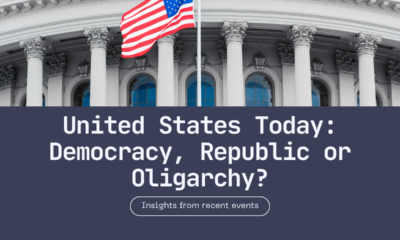Constitution
Sheriff Project highlights third party meeting

The centuries-old office of sheriff might still save America from sliding into tyranny. Today an activist explained that at a bimonthly meeting of the Constitution Party of New Jersey.
Frank Cottone has worked on his Sheriff Project for many years. Today at the Town and Country Inn in Keyport, NJ, he explained it to twenty-two fellow activists. Cottone, a resident of Monmouth County, ran against Sheriff Shaun Golden in 2010. He later decided, and told CNAV, that Golden’s “heart is in the right place,” and he understands the Constitutional role a sheriff plays.
Instead of our spinning our wheels, and strategizing, and getting nowhere, this…plan…will get results. People can now use the sheriff’s office – not “department” – to get results.
What is a sheriff?
The word sheriff, or shirriff, is a short form of the phrase Shire-Reeve. A reeve at first was an administrative officer of the crown. Beginning with William the Conqueror, the word reeve came to mean the managing steward of a manor. A Shire-Reeve administered a shire, called a county on the continent. Today an American sheriff is the chief legal officer in an American county.
Frank Cottone told his fellow activists something that some of them didn’t seem to know. No such thing as a Sheriff’s “Department” exists. A sheriff holds his office by vote of the people, not by appointment. A sheriff answers only to the people who voted for him. He does not answer to any higher official. What he says, goes. No one – not the county executive, not the governor, not even the President of the United States – can interfere with him. (During the meeting, Cottone cited a sheriff in Kentucky who refused to let US Federal troops march through his county during the War Between the States.)
Cottone identified two sheriffs in New Jersey who seem to understand their role:
- Shaun Golden (Monmouth County)
- Edward V. Rochford (Morris County)
Cottone wants to educate the other nineteen New Jersey sheriffs about their role.
A landmark case

Frank Cottone has been working on his Sheriff Project for three years. Photo: CNAV/Essex County Conservative Examiner
Cottone dwelt on the case of Printz v. United States. In 1993, Congress passed the Brady Act. That Act gets its name from James Brady, press secretary to President Ronald Reagan. John W. Hinckley III, who tried to kill Reagan, shot Brady in the head before the Secret Service could wrestle him down. Brady’s wife Sarah has sought ever since to take the guns out of the hands of every citizen except a law-enforcement officer or active-duty military service member.
The Brady Act tried to force local law-enforcement officers to:
- Collect background information on anyone applying for a permit to own or carry a gun, and,
- Report that information to federal authorities.
Sheriffs Jay Printz of Ravalli County, MT, and Richard Mack of Graham County, AZ, refused. They not only refused; they sued the government to stop it from “[pressing] them into federal service.” The Supreme Court, in 1997, agreed that Congress has no such authority. No earlier federal law had ever asked a State or local executive to do anything for the federal government. (The one exception, the Extradition Act of 1793, merely repeated the order in Article IV that State governors must send back criminal suspects who flee from one State to another.) The Court also found that the Constitution set up a system of dual sovereignty. Under that, States are still sovereign, and are not mere provinces. (A province is literally a conquered territory; from the Latin pro– and vinco, vincere, vici, victum to conquer.)
Sheriff Printz seems to have quietly welcomed the decision of the Court. But Sheriff Mack speaks often, and writes, about the Printz case and on the broader issue of the Constitution and the sheriff’s role in protecting it.
Cottone also sought to warn people that “progressive, non-Constitutional, fraudulent people in our government” care nothing about people’s rights, or the outcome of any case. He suggested that America is one Supreme Court decision away from a loss of rights, because a liberal Justice would not bind himself to a decision by the Court in any earlier case. He accused Sonia Sotomayor and Elena Kagan of a willingness to set aside precedent for the sake of a “progressive” agenda.
They don’t respect common law. They don’t respect the outcome of [earlier] cases. They have an agenda to change all that.
Can a governor appoint a sheriff?
Cottone told CNAV of a rumor he heard at the meeting: that Governor Chris Christie planned to appoint a replacement sheriff in Ocean County. Recently, Sheriff William Polhemus died after serving nine terms. The reporter covering the death wrote this:
His immediate successor will be appointed by Gov. Chris Christie, said county Freeholder Director Gerry P. Little. A new sheriff would then be elected in November, he said.
Cottone denounced Christie as
either ignorant or deliberately trying to undermine the office of sheriff.
A sheriff, he said, does not answer to a governor. To let a governor appoint a temporary sheriff would set a bad precedent. (Cottone had not heard about Christie’s plan at the time of this interview.)
Reprinted from examiner.com.
[subscribe2]
Terry A. Hurlbut has been a student of politics, philosophy, and science for more than 35 years. He is a graduate of Yale College and has served as a physician-level laboratory administrator in a 250-bed community hospital. He also is a serious student of the Bible, is conversant in its two primary original languages, and has followed the creation-science movement closely since 1993.
-

 Executive4 days ago
Executive4 days agoSecret Service chief gets no solace
-

 Civilization5 days ago
Civilization5 days agoBiden drops out of race
-

 Executive2 days ago
Executive2 days agoWaste of the Day: Louisville Taxpayers Pay Nearly $600,000 For Empty Building’s Maintenance, Security
-

 Guest Columns4 days ago
Guest Columns4 days agoFear Itself: Democrats’ Favorite Strategy Caused Their Current Chaos
-

 Executive3 days ago
Executive3 days agoWhere is Joe Biden – or Jill?
-

 Executive1 day ago
Executive1 day agoWaste of the Day: Throwback Thursday: Cities Used Crime Prevention Funds on Soccer Games, Paper Shredding
-

 Civilization4 days ago
Civilization4 days agoBuild Iron Dome in the United States To Prepare for Israel’s Worst Day
-

 Executive2 days ago
Executive2 days agoFacile and politically motivated suggestions















Chronic Colonic liked this on Facebook.
Digg Patriots liked this on Facebook.
David Sullivan liked this on Facebook.
Jeremiah Laments liked this on Facebook.
Theresa Brooks liked this on Facebook.
Sheriffs in New Jersey are nothing more than county law enforcement agents absolutely subservient to the state. I don’t know where this guy is getting his information, but he’s wrong.
New Jersey Statutes – Title 40A Municipalities and Counties – 40A:9-102 Vacancy in office, other than by expiration of term
New Jersey Laws > Municipalities and Counties > New Jersey Statutes – Title 40A Municipalities and Counties – 40A:9-102 Vacancy in office, other than by expiration of term
40A:9-102. Vacancy in office, other than by expiration of term
When a vacancy shall occur in the office of sheriff of any county, other than by expiration of term, the Governor shall fill such vacancy with the advice and consent of the Senate by appointment of a member of the same political party as that of the previous incumbent of the office, and the commission of said appointee shall expire when a successor is elected and qualified. The successor in such case shall be elected for a term of 3 years at the general election next succeeding the happening of the vacancy unless such vacancy shall occur within 37 days next preceding such election, in which case it shall be filled at the second succeeding general election.
Nathaniel, you need to educate yourself a bit, please. Go to link to cspoa.org and learn a bit. The Sheriff is NOT “subservient” to the State in anything that the state does not have jurisdiction over. For example, the sheriff can stop all federal encroachment into his county. He/She can also stop any unconstitutional activity by State officials in their county. He does NOT have to enforce unlawful or unconstitutional state statutes. He is not just “law” enforcement, but is Constitutional enforcement as well.
So in the America you and your associates advocate, a town with a Muslim majority of residents could choose their own sheriff, who would then enforce Sharia Law as the will of the people. Fascinating.
The sheriff is the CLEO of a county, not a town. Now I’d like to see any town do that. But I have to weigh different prices for different outcomes. In the end, I have to accept liberty and everything that comes with it.
Okay, county level then, but the point is the same. There is no meaning to the Constitution being “the supreme law of the land” when the residents of any patch – a county in this case- get to decide what laws they want to apply to them, and can then choose a sheriff who has unlimited power to enforce that view. “What he says, goes” leadership sounds a lot more like the threat you’re concerned about than a solution for it.
And that’s the essential, existential, even quintessential difference between you and me. By your idea of supremacy, the States are indeed provinces, and counties are sub-provinces. By your understanding, Presidents could appoint superintendents of State police forces who die in office, if such superintendents were elected. What, indeed, by your logic, is to stop a President (or a putative President, which is what we have now) from appointing a sheriff?
Actually, no they couldn’t. The Sheriff MUST obey their oath of office to uphold the constitution, NOT some abusive law that doesn’t protect people’s rights.
Somewhere in your house is an empty chair, and the “Quintessential difference” you refer to is between you and the imaginary Dinsdale sitting in it. I haven’t made any of the assertions that you claim I have.
If you don’t like the law, then change the law,and vote out the lawmakers as well. Advocating that if you don’t like the law, then vote for a sheriff who will pick and choose what will be enforced is abandoning the rule of law.
What you seem to want is a return to the days of Sheriff Bull Connor, where people were okay with living under a thug with a gun who treated citizens differently based on bias, not the law. It was only okay if he was “your” thug, hired with your vote to uphold an attitude instead of the. If you didn’t vote for him or didn’t share the attitude, then too bad for you- you’re not going to expect equality or justice under the law in that county, because it’s now based on a man, his attitude and his power, not the actual laws on the books.
“Equal protection under the law” is meaningless when the laws of a nation are allowed to vary from county to county. A law-enforcement system based in an era of travel by foot and horse is not a way forward, but a denial that we live in a republic where progress is often a compromise. Looking to hire a man with a gun to hold off on the laws you don’t like isn’t patriotism, it’s paranoia.
And somewhere in YOUR house is an empty chair, and in that chair sits your own vision of me, wearing a mustache (I stay clean-shaven) and flying a modified Stars and Bars with the classic inverted swastika in the center. (Did you even know that the original swastika had strokes that pointed anticlockwise?)
What I want is the kind of sheriff that will stand up to our putative President, who shouldn’t even be there, when he issues his Executive Orders to supersede the Second Amendment.
Who said anything about “law based on the man”? You did. Not I. I expect a sheriff to support and defend the United States Constitution, against all enemies, foreign and domestic. And someone occupying the office of President unlawfully, is a domestic enemy of the Constitution. So also is one who suspends the Constitution and abrogates the privileges and immunities of citizens of the United States.
I’m not replying to an imaginary Terry Hurlbut, just your words from above :
” He does not answer to any higher official. What he says, goes. No one – not the county executive, not the governor, not even the President of the United States – can interfere with him.”
Sounds great when you agree with the sheriff’s policies and attitude, and like a nightmare if you don’t.
Any respect for constitutional rights has limits- freedom of worship is nit a license to commit human sacrifice if your beliefs require it, freedom of speech is not a license to slander, and the right to keep and bear arms is denied to felons and the insane even though the constitution has no such caveats.
Civilized people use lawmakers, courts, and law enforcement bound to the law. People who rely on choosing a man with a gun to decide what rules apply in their locale fall under another description.
A sheriff answers to the people who elected him.
And I already know that you do not agree with the policies and practices of some famous constitutional sheriffs. Like:
Sheriff/Coroner Jay Printz of Ravalli County, MT
Sheriff Richard Mack of Graham County, AZ (retired)
Sheriff Joe Arpaio of Maricopa County, AZ
Not to mention a Kentucky sheriff who told the federal government that he will NOT confiscate guns even if they ask.
So it’s wrong for a Supreme Court jurist to interpret what the intent of a Constitutional statement means in terms of everyday life, but It’s right for a hired hand with a gun to do it, even when 49.9 of the citizens in the county may have voted for someone else.
Yes, it is wrong for a Supreme Court Justice to apply modern construction on words written centuries before, and to assume without warrant that the Framers intended the words to change their meaning with the times.
Dinsdale, you make an error in the word “Interpreting.” The constitution is not a “living” document as you intimate, which needs to be “interpreted” through today’s society glasses. No, law is law. If something needs to be “interpreted,” according to “everyday life,” it is not a law because it is ambiguous at best. The Constitution is NOT ambiguous and says what it means.
Countyguard, your own statements in this thread seem to contradict each other. On the one hand you say this:
“The constitution is not a “living” document as you intimate, which needs to be “interpreted” through today’s society glasses. No, law is law. If something needs to be “interpreted,” according to “everyday life,” it is not a law because it is ambiguous at best. The Constitution is NOT ambiguous and says what it means.”
…and then you say this:
“The Sheriff MUST obey their oath of office to uphold the constitution, NOT some abusive law that doesn’t protect people’s rights.”
So “the law is the law”, unless someone decides that it’s an abusive law, and if that’s the opinion the law will be ignored.
The Constitution isn’t really ambiguous, but in some respects it leaves room for interpretation. If “Freedom of speech” was an absolute, uninterpretable right, then there could be no laws against slander, obscenity, inciting riots, defamation of character, etc. But we’ve had over 200 years of people interpreting what that right means without arguing that limits can be set on it in the first place.
As the governor of California, Ronald Reagan passed the Mulford Act, which set limits on the 2nd Amendment rights of people in that state,and the NRA supported it at the time. Reagan also supported background checks and an assault weapons ban without believing this compromised 2nd Amendment rights. In his view, the right to keep and bear arms for sport and self-defense was not unlimited in terms of where you could carry arms, and the degree of killing capacity that citizens should possess as “arms”. Even the seriously conservative Justice Scalia agreed with the principle that 2nd Amendment rights could be parameterized in reasonable ways in the interest of society.
The point I made above, which you and Terry continue to sidestep, is that sheriffs are fallible humans and no more or less likely to be a good judge of what is “constitutional” or “abusive” in a law. In a country living by the principles of the Constitution, that is the domain of the courts, and it is then our responsibility to respect those decisions so the law is applied equally for all citizens.
“Did you even know that the original swastika had strokes that pointed anticlockwise?”
I’ve seen both.
“abrogates the privileges and immunities of citizens of the United States.”
Merely out of curiosity, how do you feel about whacking US citizens who just happen to be in an al Qaeda training camp in Yemen? Are they entitled to due process of law even there, or is it all right to send them a Hellfire sandwich? My leftie girlfriend says they’re entitled to a trial. I say that US law only applies inside the USA and if the Yemeni government say it’s OK to blast the camps, it’s OK to blast the camps. As far as I’m concerned anyone who’s in an AQ camp voluntarily deserves what they get anyway.
The chief flaw in that program is that Congress never passed a “Congressional Joint Resolution in Defense of the Republic” naming Anwar al-Awlaki as one levying war against the United States. The phrase I just used is an adaptation of the ancient Roman phrase “Senatus consultum de re publica defendenda.” That was Rome’s way of declaring war against an individual, rather than against a nation-state. (Marcus Tullius Cicero, during his term as senior consul of Rome, renamed that law “Senatus Consultum Ultimum,” in asking the Senate of Rome to declare war against Lucius Sergius Catiline when he tried to march against Rome.)
What makes cases like these so difficult is that, thus far, every person so targeted has indeed levied war against the United States. How? By murdering American citizens at home and abroad and encouraging others to do the same. But someday, you shall see BHO order such a strike against one who is not so guilty. That’s why it should at least take an act of Congress to name such a one as a target, just as it took an act of the Senate of Rome to do it in the days of the Roman Republic.
“That’s why it should at least take an act of Congress to name such a one as a target,”
I don’t see why. Apart from anything else it isn’t terribly realistic; targeting is hard enough as it is without having the aircraft hold its orbit while an act of Congress is passed allowing it to fire. Why not just make it clear that anyone, of whatever nationality, who’s in an al Qaeda camp is liable to get killed at any time?
“But someday, you shall see BHO order such a strike against one who is not so guilty.”
Doubt it. Anyway, I’m not sure about the US armed forces but in the British military it is an offence to carry out an illegal order, so I imagine that such a strike would never be launched. I really can’t see the whole chain of comanders and legal advisers needed to authorise the missile launch just sitting back and saying “Oh well.”
The time to declare someone an enemy combatant is well before you get him in your drone sights. Which is why the Roman Senate passed its SCDRD/SCU resolutions well in advance of any battle.
Now declaring war against the organization that calls itself “The Base” would probably serve just as well. It’s just that people have this idea that one nation-state can declare war against another, but never against an NGO, nor an individual. I do not agree. But I have a problem with a government launching a fatal strike against one of its own citizens (or loyal subjects) absent any such advance declaration.
Technically it is an offense against the Uniform Code of Military Justice to carry out an unlawful order. But: who decides what orders are lawful, and what are unlawful? Sadly, we’re at the point at which the phrase “lawful order” means whatever the CO/OIC/OTC/theater commander says it means, any time (s)he says it.
“It’s just that people have this idea that one nation-state can declare war against another, but never against an NGO, nor an individual. I do not agree.”
Neither do I. We should have declared war against PIRA in 1970, for example, and shot the f*cking lot of them.
“But I have a problem with a government launching a fatal strike against one of its own citizens (or loyal subjects) absent any such advance declaration.”
Whereas, if that citizen is in a terrorist training camp, I don’t. I’m glad al-Awlaki and his foul son are dead and I don’t care a whit about their rights. They abandoned those rights when they flew to Yemen and joined al Qaeda. British islamists have been killed in Afghanistan by the British Army. No attempt was even made to arrest them and I don’t care. No Brit (or American, or German, or any other non-Afghan) should be carrying a gun in Afghanistan except as a member of an ISAF military unit or a PSC. Any that are, kill ’em. I won’t shed a single tear.
Well, that’s the key. Anwar al-Awlaki declared his loyalties, or at least his adherence, by his actions. A proper declaration of war against “The Base” would mean that al-Awlaki, adhering *materially* to that group, defined himself a traitor. Note: I said *materially*. The First Amendment says that Congress shall not abridge the freedom of *speech,* while Article III still defines treason as “levying war…or adhering to [an enemy or] enemies, giving them aid and comfort.” So I find that the Constitution requires DEEDS, NOT WORDS to mark a man a traitor. I say that for the record, of course. I acknowledge that you pointed out the “deeds” of the al-Awlakis.
The sloppiness of our Congress in substituting “authorizations for the use of military force” for formal declarations of war, has brought us to the present pass. An AUMF typically applies to a particular theater of war. It is not quite the same as a CJRDR (Congressional Joint Resolution for the Defense of the Republic, akin to Cicero’s Ultimate Senate Resolution against Lucius Sergius Catiline).
“Sadly, we’re at the point at which the phrase “lawful order” means whatever the CO/OIC/OTC/theater commander says it means, any time (s)he says it.”
Actually no, we’re not. An illegal order is any order that violates the Laws of Armed Conflict or any other laws that apply. UK servicemen in Afghanistan are subject to LOAC, UK law and Queen’s Regulations, for example, and any order that violates one of those is illegal.
My bad- Connor was a “Commissioner of Public Safety”, not a sheriff, but he was voted in at the local level to run the police and enforce the law the way the citizens of Birmingham, Alabama wanted it. The constitutional right to peaceful assembly, free speech and freedom of the press only meant what he decided it should mean.
[…] the Sheriff. I have a suggestion for the Governors, and the legislature; Read the article posted in CNAV, or Essex County Conservative Examiner, an interview held with Mr. Frank Cottone of Monmouth County […]
DinsdaleP… you are revealing your ignorance even further. “Free Speech? Yes, if it does NOT actually damage someone… you know… an injured party that has provable damages from hard from someone else, (not emotional pablum, mind you) not like your minions who throw anyone in jail for any alleged offense where no one was actually injured. When I say “the law is the law,” I mean organic, law, “friend… not bogus defacto, statutory laws that counter the constitution. PLEASE get an education on law, will you?
Well I guess we can throw out obscenity laws then, and let broadcasters show XXX movies if that’s their business model for profitability since these ate all expressions of free speech. There’s no tangible harm after all, and no one is forced to watch if they don’t want to.
In your line of reasoning, I could walk around with a grenade or pipe bomb as my personal choice of arms for self defense. Like the guy walking around a mall with an AR-15 on his shoulder, it’s perfectly ok as long as I intend to only use them responsibly, right? Pretty ridiculous actually, but that’s the problem with a black and white declaration that “rights” can have no parameters applied to them. Even the originalist Justice Scalia supports that principle.
Yeah, well, hey—the era of the free-of-charge-tunable broadcaster is over. It died with the analog dial. For most content these days, you have to subscribe.
That’s irrelevant, anyway. What’s relevant is that the US Constitution assumes that the people, as an aggregate, are trustworthy. Paramilitary forces that call themselves “police” are not. Indeed they were unknown in 1789.
You would not have just one man with an AR-15 and no one else armed at all. That guy with the AR-15 would have no way of knowing who ELSE carried a similar weapon, or HOW MANY OTHERS carried weapons of SOME kind. That’s why he would be far less likely to go on a shooting spree.
But someone armed as well as that, would be a Godsend if a drug-cartel militia, or a sleeper unit of that organization of latter-day Assassins who call themselves The Base, were to come to call…
“What’s relevant is that the US Constitution assumes that the people, as an aggregate, are trustworthy.”
Your crime figures suggest otherwise. The framers of the Constitution were great thinkers, but perhaps on this occasion too trusting. Americans are violent. You like killing each other, at a rate found in no other civilised country. Sad but true.
“That guy with the AR-15 would have no way of knowing who ELSE carried a similar weapon”
Unless he was blind then yes, he would. He’d just have to look around for the other guys with rifles.
“or HOW MANY OTHERS carried weapons of SOME kind.”
Terry, if I have an assault rifle I don’t CARE how many people have their trusty Kel-Tec 9mm tucked down the back of their leisure suit trousers. That’s because I have them hopelessly outgunned.
In any case, most people who go on shooting sprees don’t care if they die or not. Your hypothetical deterrent effect assumes a rational shooter. Rational people don’t open up in the mall with an assault rifle. Arguably they don’t feel compelled to take a military weapon shopping in the first place.
I suspect that you might be a trifle overconfident in your training. I definitely suggest that most people who plan to go on a shooting spree have NOT had your training. And a hypothetical psychotic shooter would definitely be overconfident. Such is the nature of psychosis that the subject does not even consider other people “real,” let alone truly threatening.
In any event, it’s all a matter of values. I value freedom. I realize that you, in particular, would apply the privilege of gun ownership far more widely than would, say, Sarah Brady. But a privilege, no matter how widely offered, remains a privilege.
“I suspect that you might be a trifle overconfident in your training.”
Well, that’s your privilege of course. However my reply is “No, not really.”
“I definitely suggest that most people who plan to go on a shooting spree have NOT had your training.”
Oh, I agree.
“And a hypothetical psychotic shooter would definitely be overconfident.”
Exactly; overconfident. And therefore LESS likely to be deterred by the thought of someone carrying a pistol (which is, of course, no match for an assault rifle.)
Overconfident, and careless. As careless as was Khalid Sheikh Muhammad. Which was how the Pakistani police caught him with his pants down (literally!) with a laptop computer with a cleartext file containing all his passwords. Duh-hhh! If the G-3 of Al-Qaeda could so violate tradecraft, how well can we really expect a psychopath to do, when he doesn’t even think the rest of us are “real”?
COn the subject of training, two thoughts.
First, a news story from NYC yesterday covered the city being sued by bystanders wounded in a shootout by the Empire State Building this past summer. The police were tipped off to a lone shooter with a handgun who had just shot a man in public. They confronted the shooter in a busy intersection, and when he pulled his gun he was shot and killed by the cops. Unfortunately, 19 innocent bystanders were wounded as well, all by the police since the suspect never got off a shot.
As a matter of general principle I don’t believe the police should be sued for making a snap judgment to open fire at that time, given the specific circumstances. However the person filing the suit has a point- there’s a problem with training and/or discipline when 19 innocent people get hurt to take out one bad guy with a handgun. Since these were trained police with handguns themselves, one can only imagine the outcome if a group of civilians tried this, let alone if any of them used automatic weapons. A gun-toting populace is not a deterrent against the mentally ill, and more likely to lead to unnecessary friendly fire harm.
The second point is about training. A charter school decided to hire a retired lawman, a former sheriff ironically,as an armed guard. Less than 2 weeks into the job, he was disciplined for leaving his unloaded gun in the mens room by accident. This idiot made no one safer with his presence, and only increased the risk of danger had a kid found the gun first. There will always be a certain percentage of reckless, irresponsible fools in the world, but we don’t need to insist that they carry guns as a right, too.
“Since these were trained police with handguns themselves”
Police firearms training in the USA is generally, from what I know of it, poor to non-existent. They may be proficient enough on a range but they have minimal or no combat shooting skills.
“one can only imagine the outcome if a group of civilians tried this, let alone if any of them used automatic weapons.”
I shudder to think. Bodies everywhere, most likely. And that’s with pistols. Hand-held automatic weapons, such as selective-fire assault rifles set to automatic, are of limited use even in the hands of a trained soldier. Operated by a civilian they’d just be bullet hoses.
“The second point is about training. A charter school decided to hire a retired lawman, a former sheriff ironically,as an armed guard. Less than 2 weeks into the job, he was disciplined for leaving his unloaded gun in the mens room by accident.”
Well, to be fair that’s not really a training issue (although I doubt I’d count him as trained anyway.) The fact that he was past retirement age probably had more to do with it. In fact it’s surprisingly easy to do. Google “pistol toilet sainsburys hitchin” for one hilarious example. The lady involved was definitely not a retired sheriff…
I suppose I was thinking “training” because this guy failed gun safety 101, but you’re right. It’s really more about human fallibility, and in this case, the risk that was introduced by this idiot that wasn’t there without him. His involvement made the school less safe, not more.
[…] law instituted by the state or federal government. In short, he is the last line of defense against an overreaching […]